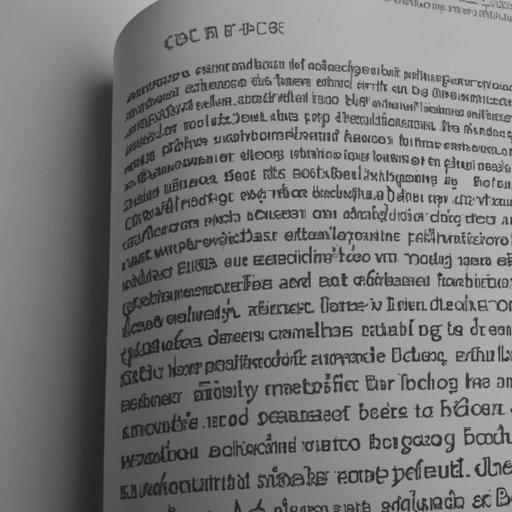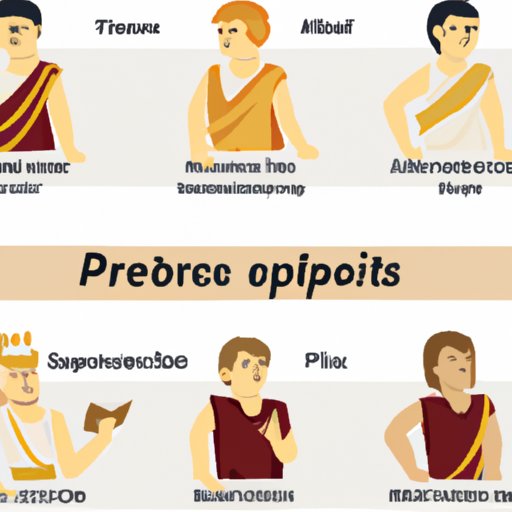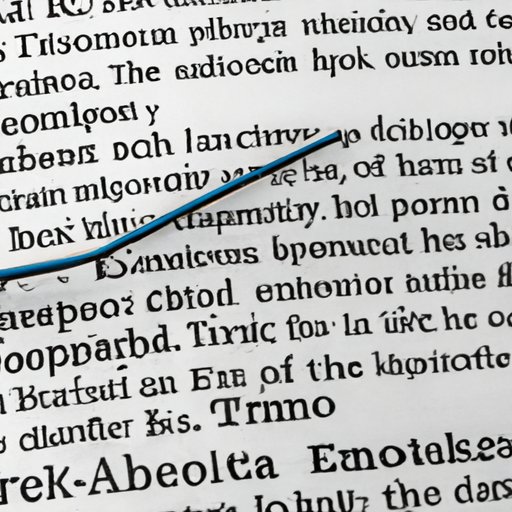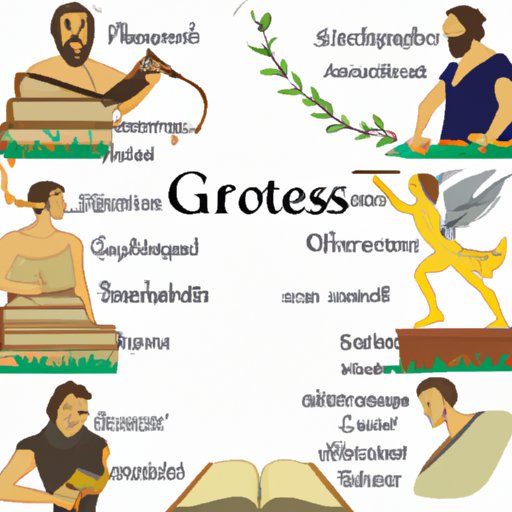Introduction
The ancient Greeks have left us an impressive body of literature that has shaped our understanding of the world. This article will explore a sample of Greek literature, examining its key themes, historical context, characters, symbolism, and literary techniques. By studying this sample of Greek literature, we can gain a better understanding of how the Greeks viewed their world and how their writing has had an impact on modern literature.
Overview of the Sample of Greek Literature
The sample of Greek literature being examined in this article is Homer’s epic poem, The Iliad. This work tells the story of the Trojan War and the struggles of the legendary warrior Achilles. It is considered one of the most significant works of Western literature, as it has been a source of inspiration for writers and artists throughout the ages.
Analysis of Key Themes in the Sample of Greek Literature
The Iliad contains several important themes that have resonated with readers for centuries. One of the most prominent themes is the idea of fate versus free will. In the poem, the gods are constantly intervening in the lives of the mortals, controlling their destinies and manipulating them for their own ends. However, the characters also have the power to make their own choices, which can determine their fates. This tension between fate and free will is a powerful theme that speaks to the human experience.
Another important theme in The Iliad is the concept of honor and glory. Throughout the poem, characters strive to achieve fame and glory, often at the expense of their own safety or the well-being of others. This idea of putting honor and glory above all else is a common theme in Greek literature and can be seen in many of the other works from this period.
Finally, The Iliad also deals with the idea of loyalty and friendship. Throughout the poem, the characters demonstrate varying degrees of loyalty to each other, even when faced with difficult decisions. This theme of loyalty and friendship is one that has been explored by many authors since then and still resonates with readers today.

Comparison to Other Works From the Same Period
To fully understand the significance of The Iliad, it is important to compare it to other works from the same period. Many of the themes explored in The Iliad can be seen in other works from the same era, such as The Odyssey by Homer, The Aeneid by Virgil, and The Oresteia by Aeschylus. These works all explore the idea of fate versus free will, the pursuit of honor and glory, and the importance of loyalty and friendship. However, each of these works presents these themes in a unique way, demonstrating the diversity of approaches taken by ancient Greek authors.
In addition, The Iliad has had a profound influence on later works of literature. For example, the idea of an epic hero struggling against forces beyond his control can be seen in J.R.R. Tolkien’s The Lord of the Rings and C.S. Lewis’s The Chronicles of Narnia. Similarly, the theme of loyalty and friendship is explored in J.K. Rowling’s Harry Potter series. Through these examples, it is clear that The Iliad has had a lasting impact on modern literature.

Historical Context of the Sample of Greek Literature
To truly appreciate the sample of Greek literature, it is important to examine the historical context in which it was written. The Iliad was composed during the height of the Greek civilization, when the city-states were in a period of great prosperity. This period saw the emergence of democracy and the development of philosophy, science, and art. Additionally, there was a strong emphasis on the pursuit of knowledge and the exploration of new ideas.
This period also saw the rise of militarism and imperialism, as the city-states began to expand their territories through warfare. This is reflected in The Iliad, which focuses on the events of the Trojan War. The poem is filled with stories of bloodshed and violence, but also of bravery and courage. Through the poem, Homer depicts the consequences of war and the difficulty of making difficult decisions in the face of danger.
By understanding the historical context in which The Iliad was written, we can gain a deeper appreciation for the poem and the themes it explores. We can see how the events of the time shaped the characters and the story, and how they continue to resonate with readers today.

Character Study of Main Characters in the Sample of Greek Literature
A key element of The Iliad is the characterization of its main characters. The poem focuses primarily on the legendary warrior Achilles, who is driven by his own sense of honor and glory. His pride and loyalty to his friends lead him to make reckless decisions, which ultimately cost him his life. Similarly, the character of Hector is portrayed as a noble warrior who is driven by his own sense of duty and honor. He chooses to fight for his people despite the odds against him, and his courage is ultimately his downfall.
Other characters in the poem, such as Agamemnon and Odysseus, are presented as cunning strategists who use their wits to outwit their enemies. Finally, the gods are depicted as meddlesome figures who are constantly interfering in the affairs of mortals, often to their detriment. Through these characters, Homer is able to explore the complexities of human nature and the motivations that drive us.
Exploration of Symbolism and Imagery Used in the Sample of Greek Literature
The Iliad is filled with vivid imagery and symbolism that help to tell the story and capture the emotions of the characters. For example, the image of Achilles dragging the body of Hector around the walls of Troy is a powerful symbol of his anger and grief. Similarly, the image of the Trojan Horse is a symbol of the deception used by the Greeks to win the war. Through these symbols, Homer is able to convey the emotions of the characters and the stakes of the conflict.
Homer also uses imagery to create a vivid picture of the battlefield and the horrors of war. The descriptions of death and destruction are both gruesome and haunting, illustrating the cost of war in vivid detail. Additionally, the imagery of the gods descending from Mount Olympus is used to emphasize their power and influence over the mortals below.

Examination of Literary Techniques Used in the Sample of Greek Literature
The Iliad is an incredibly complex work, and its success is due in part to the sophisticated literary techniques used by Homer. For example, Homer employs a wide variety of poetic devices, such as alliteration, assonance, and rhyme, to create a lyrical quality to the poem. Additionally, he uses repetition to emphasize certain words or ideas and to create a sense of rhythm and structure. These techniques help to bring the poem to life and to draw the reader into the story.
Homer also uses a variety of narrative techniques to create suspense and to keep the reader engaged. He frequently shifts between different points of view, allowing the reader to experience the story from multiple perspectives. Additionally, he utilizes foreshadowing to hint at future events and to increase the tension of the story. Through these techniques, Homer is able to craft a gripping tale that continues to captivate readers today.
Conclusion
The Iliad is a masterpiece of Greek literature that has had a profound impact on literature and culture throughout the ages. This article has explored the poem’s key themes, historical context, characters, symbolism, and literary techniques. Through this examination, we can gain a better understanding of how the poem has shaped our understanding of the world and how it continues to resonate with readers today.
(Note: Is this article not meeting your expectations? Do you have knowledge or insights to share? Unlock new opportunities and expand your reach by joining our authors team. Click Registration to join us and share your expertise with our readers.)
